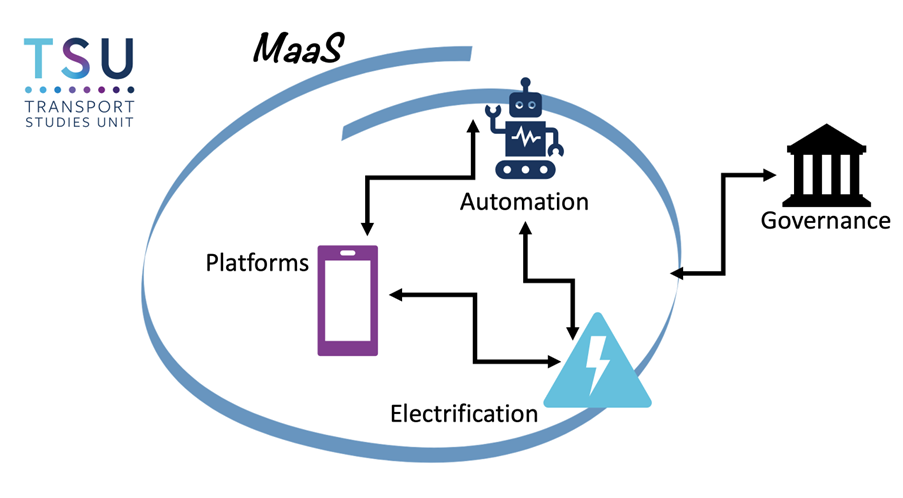Global Challenges in Transport: Smart mobilities
Overview
The Global Challenges in Transport: Smart mobilities online course offers an exceptional opportunity to critically think about the ways new technologies are changing transport systems around the world. This 6-week course will focus on the four major contemporary topics of transport innovation: electrification, automation, platforms, and mobility as a service (MaaS), considering how these systems affect mobility governance in different contexts.
Academics from the Transport Studies Unit at Oxford University will be joined by experts from different sectors and contexts in delivering this course, which will explore the opportunities and limitations of the technological changes associated to smart mobilities.
As with all TSU online courses, you will have interactive live sessions with lecturers and experts to enrich your learning experience and broaden your professional network. Join us in this effort to reimagine mobility futures!
Global Challenges in Transport: Smart mobilities | Status: CLOSED |
| Course Director: Dr Juan Pablo Orjuela | |
| Dates: 15 April - 24 May 2024 | |
| Course Format: Online | |
| Course Length: 6 weeks | |
| Course Fee: Private sector £2,500; Public sector £1,500. Discounts and scholarships available. | |
| Key Dates: Last day for all applications (including scholarships): 26 March 2024. | |
| Applications closed > | |
Learning Objectives
- To broaden transport professionals' understanding of the various technological innovations in mobility systems today.
- To reflect critically on the changes induced by new technological developments in transport systems.
- To develop an enhanced understanding of the opportunities and limitations of electrification, automation, and platformisation in transport, and the way these technologies are integrated and governed.
Learning Outcomes
Attending this course will enable you to:
- Apply the understanding of how transport technologies are changing mobility practices to your own transport practice.
- Utilise a variety of theoretical and methodological approaches to address questions around the opportunities and limitations of electrification, automation, platform use, and their integration in mobility as a service.
- Understand and critically evaluate the governance challenges these new technologies in transport pose.
Course content and lecturers
The Global Challenges in Transport: Smart mobilities course begins with an introductory week followed by a detailed exploration and discussion of the four major technological changes in transport today: electrification, automation, platform use, and their integration in mobility as a service (MaaS). We will look at electrification and automation not only for private passenger transport but their opportunities in freight and public transport. Our platforms week will include examples from different geographical contexts and a discussion on the implications these may have in both rapidly growing and rapidly changing urban environments. We will then move on to the integration of many of these technologies through the Mobility as a Service concept, before addressing the governance challenges that all these changes present for transport systems. The course will conclude with presentations from course participants in which they will be able to combine their understanding of the course content with their own area(s) of expertise, practice and knowledge.

Three interconnected concepts (electrification, automation, and platforms) within a circle of mobility as a service (MaaS), with Governance dealing with their relationships.
Course Schedule
The course has an estimated time commitment of approximately 42 hours including individual study, small group work, and live sessions. Individual study includes going through pre-recorded lectures and any additional material suggested by lecturers. Participants will be divided into small groups and asked to present their work to their peers and TSU researchers at the end of the course. All participants must prepare a short presentation of their current work/research in week 1.
| Week 1 | Week 2 | Week 3 | Week 4 | Week 5 | Week 6 | Total | |
|---|---|---|---|---|---|---|---|
| Individual study | 3 hours | 3 hours | 3 hours | 3 hours | 3 hours | - | 15 hours |
| Small group work | - | 90 min | 90 min | 90 min | 90 min | 30 min | 6.5 hours |
| Live sessions with all participants | 3 hours | 3 hours | 3 hours | 3 hours | 3 hours | 3 hours | 18 hours |
| Progress sessions in small groups | 30 min | 30 min | 30 min | 30 min | 30 min | - | 2.5 hours |
Combined total estimated time commitment: 42 hours over 6 weeks.
Live sessions will take place every Tuesday and Thursday at 12:30pm BST. Additional live sessions will take place on the Friday of Week 1 and Week 6, and the Course Director will meet with participants in small groups on the remaining Fridays to resolve any doubts and advise on group work progress.
| Mon | Tue | Wed | Thu | Fri |
|---|---|---|---|---|
| Week 1 - Introduction | ||||
15 Apr | 16 Apr
| 17 Apr | 18 Apr
| 19 Apr
|
| Week 2 - Electrification | ||||
22 Apr | 23 Apr
| 24 Apr | 25 Apr
| 26 Apr
|
| Week 3 - Automation | ||||
29 Apr | 30 Apr
| 1 May | 2 May
| 3 May
|
| Week 4 - Platforms and MaaS | ||||
6 May | 7 May
| 8 May | 9 May
| 10 May
|
| Week 5 - Governance | ||||
13 May | 14 May
| 15 May | 16 May
| 17 May
|
| Week 6 - Conclusions | ||||
20 May | 21 May
| 22 May | 23 May
| 24 May
|
Please note that the programme is indicative and may be subject to change.
Who should attend?
The Global Challenges in Transport: Smart mobilities course is designed for experienced transport professionals and researchers with a minimum of 3 years' experience in the sector and aims to bring together the world's leading experts from academia, policy and practice to address complex transport challenges. The course is intended for those who are looking to expand their knowledge horizons and gain more in-depth and interdisciplinary understandings of the challenges and solutions in delivering sustainable transport.
We specifically invite applications from:
- Professionals in the transport and mobility consultancy sector in charge of implementing new solutions for transport systems, especially those involved in electrification, automation, MaaS, and related fields.
- Individuals with experience in transportation consulting, planning, and related government agencies.
- Academics and researchers in transportation planning, civil engineering, economics, planning, and/or urban mobility.
Scholarship Opportunities
Various discount options as well as scholarship opportunities are available. Find out more about our scholarships or contact us: exed@tsu.ox.ac.uk
Contact us
If you have any queries about the course, please contact us: exed@tsu.ox.ac.uk
Or find out more about our Global Challenges in Transport Programme and our other courses
In brief
This 6-week online course introduces a range of approaches to thinking about smart mobilities, with particular emphasis on new technologies and the challenges they imply. It proposes a variety of theoretical and methodological approaches for developing transport systems able to adapt to transport innovations.
The course adopts a strong interdisciplinary and interactive approach including insights from social science, environmental science, and both human and physical geography. Through live sessions, participants get real-time interaction with experts and course lecturers from around the world.
The estimated time commitment for this course is 42 hours including independent study, group work, and live sessions.
If you have any queries about the course, please contact us: exed@tsu.ox.ac.uk

